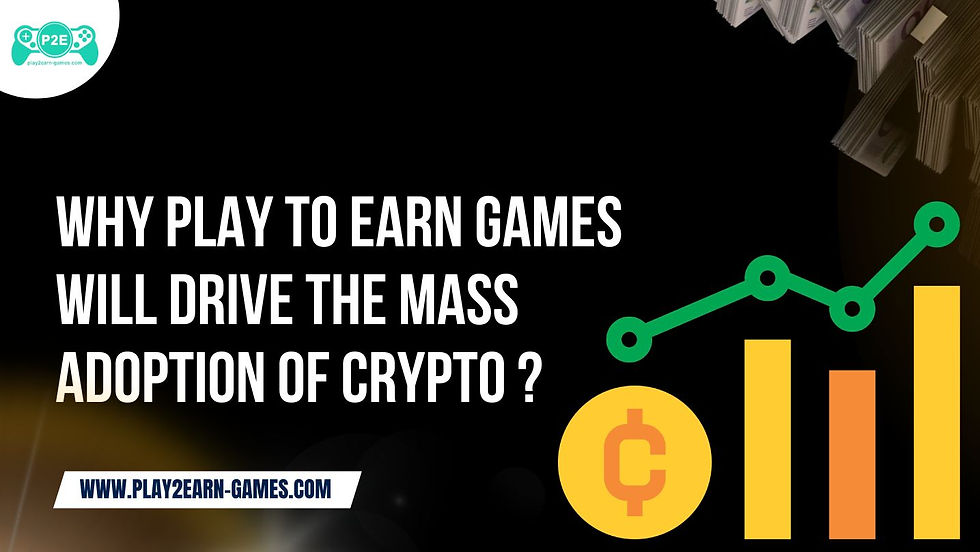Why Play To Earn Games Will Drive the Mass Adoption of Crypto
- Mary

- Jun 18, 2024
- 4 min read
Updated: Aug 26, 2024

When people began to understand the significance of Satoshi Nakamoto's white paper, blockchain technology was often highlighted as "the next big thing." Initially, it was a key component of the Bitcoin ecosystem, but it has since been embraced by tens of thousands of crypto projects.
As you're likely aware, the influence of this disruptive technology extends far beyond being a database for revolutionary finance. Researchers and developers have been experimenting with blockchain applications for various innovative and unconventional uses.
The Size & Adaptability of the Gaming Community
Consequently, innovative games attract many users, with over 3.2 billion people playing games daily. These gaming communities are strategic and highly engaged. In essence, gamers have a unique ability to learn complex and new technologies faster than most people.
By nature, gamers are adaptive. They enjoy experimenting with new concepts and are open to ideas that enhance their gaming experience or boost their satisfaction levels (i.e., deliver a dopamine rush) in their favourite games.
Endless Possibilities
The potential for NFTs and blockchain games is immense. Digital assets are already integrated into many games. Imagine unlocking a digital item as a reward for defeating an in-game adversary or winning a tournament, and that reward is a unique NFT.
You could then sell that NFT for ETH on the secondary market, using the proceeds to enhance your gaming experience on the same or different platforms. Alternatively, you could use the earnings to cover everyday expenses, a common practice among gamers in South America.
Benefits of the merger of crypto and the gaming industry

Combining blockchain with the gaming sector has advantages for both industries:
With the value added of cryptocurrency and NFT scarcity, new gameplay ideas can drive innovation to a new level. Unlocking digital assets with real-world value stands to enhance the gamer's overall experience.
Rewards can provide an impetus to play more games. Gamers are actively seeking out new ventures by introducing schemes such as P2E. There's now something tangible for users to gain from the time they spend gaming.
A key benefit for gamers is that assets earned in games can be owned outside of the game. For game developers, the minted non-fungible tokens could open up other applications, such as resale commissions, revenue sharing from other platforms, and increased user awareness in the marketplaces.
Playing games is a universal experience. Players make micro-transactions every day, and those transactions require integration with payment gateways. These gateways have all the inefficiencies and fees of traditional finance. Blockchain technology aims to reduce or remove these fees altogether.
In effect, blockchain gaming presents a new level of decentralized economy to the gaming sector. This has the potential to gamify the emerging cryptocurrency economy. Gamification is one of the greatest ways to drive the successful adoption of new technologies.
Developers are actively building crypto and blockchain features into the player experience. For the first time, new games have the opportunity to add scarcity to their environment.
The metaverse offers blockchain-based game developers a network to build the future. Game-changing applications are being released as the crypto world and the online gaming communities discover how to work together. It's a new market for crypto adoption and rewards-based online gaming, attracting the most innovative gamers into a new scenario.
Impact of blockchain gaming on crypto adoption
The impact of gaming on crypto adoption has been substantial. Millions of users have encountered digital currencies and blockchain technology through gaming, leading to gamers' growing interest in crypto. Crypto in blockchain gaming has made transactions faster, more secure, and less expensive.
Cryptocurrencies' decentralized nature and anonymity have made them appealing for gamers who value privacy and security. A survey by Bitflyer found that 43% of gamers in the US own some form of cryptocurrency.
Gaming has also broadened awareness of crypto among a wider audience. Many gamers have become interested in crypto through playing crypto-based games, introducing them to blockchain technology and the potential applications of crypto beyond gaming.
Growing interest in crypto among gamers
Many gamers believe that crypto has the potential to revolutionize the gaming industry. Cryptocurrency's decentralization, security, and fast transaction speeds make it an attractive option for gamers who value these features in their gaming experiences.
Furthermore, the rise of e-sports has fueled the growing interest in crypto among gamers. E-sports tournaments often feature large prize pools, with crypto commonly used as the mode of payment. This popularity has helped increase crypto adoption and legitimize its use within the gaming industry.
The rising popularity of crypto-based games
The rise of crypto-based games has accelerated crypto adoption and created new opportunities for developers and gamers. With the potential for decentralized ownership of in-game assets and the ability to earn crypto through gameplay, these games offer a fresh and exciting way to experience gaming.
The future of crypto and blockchain gaming
The future of crypto and gaming appears promising. As the gaming industry continues to expand and evolve, the use of crypto is expected to grow alongside it. More games will integrate crypto into their platforms, providing gamers new opportunities to earn and spend digital currencies. As more people become acquainted with crypto through gaming, we anticipate widespread technology adoption in the coming years.
Conclusion
The experience keeps improving for gamers, providing them more opportunities to earn gameplay rewards and connect with other players. Earning crypto and converting it into money is also a significant advantage.
For game developers, the availability of more tools and ecosystem interoperability attracts more players. Developers can launch their tokens or use existing cryptocurrencies, fostering loyalty and expanding access to larger communities.
With blockchain being integrated into the gaming industry, some challenges associated with real money transactions are eliminated. This makes gaming the ideal environment for experimenting with blockchain's first mass adoption.



Comments